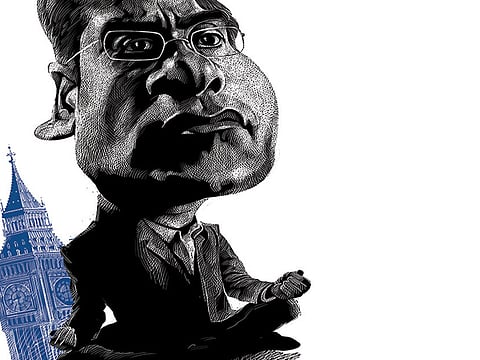Cricket’s Frankenstein
The former Indian Premier League boss is now hated by the very people who were once close to him

Lalit Modi, a suave businessman, who rose to become the chairman and commissioner of the Indian Premier League (IPL), was once lauded for his marketing acumen. He transformed IPL into one of the richest and most popular cricket tournaments in the world, but today he is the man most hated by the very people who had projected him as a genius.
Many cricket administrators had used him to come to power in the Board of Control for Cricket in India (BCCI), destroy the Indian Cricket League (ICL), a rival tournament launched by the Zee Group, and create their own league called the IPL that filled the coffers of the BCCI. Politicians too exploited his clout and intelligence for their own gains. All of them are now running for cover.
Modi now lives like a fugitive in the United Kingdom, following many cases of alleged financial irregularities and money-laundering. The Enforcement Directorate in India had issued him numerous show-cause notices for financial irregularities, but he refused to return to India claiming threats to his life.
Modi frequently fires a salvo from his sprawling five-storey mansion in Chelsea, London, at cricket administrators and politicians who had once used him but have now deserted him when he needs them most. He has literally turned out to be their Frankenstein and even the Indian government is on shaky ground owing to the benefits some politicians in the ruling party had offered him. Reports claim that he has even used the name of Prince Andrew, Duke of York, and the second son of Queen Elizabeth II, who has known him for several years, in acquiring his British travel papers. With India’s External Affairs Minister Sushma Swaraj reported to have also helped him acquire his British travel papers, and Rajasthan Chief Minister Vasundhara Raje alleged to have signed an affidavit to back Modi’s application for resident status in UK, it only proves that Modi has been at his best with his manipulative skills.
Modi was born in Delhi on November 29, 1963, the son of Krishna Kumar Modi, and grandson of Gujar Mal Modi, two reputed Indian businessmen. His father is the chairman of Modi Enterprises, a $5 billion (Dh18.39 billion) business empire. He attended St Joseph’s College in Nainital, but was expelled for bunking classes. He often faced kidnapping threats owing to his rich parents. His hostel mates revealed that Modi used to go on shopping trips in a helicopter!
Modi went to the United States to study business administration. While at Duke University in North Carolina, he was reportedly arrested for drug possession and kidnapping and unlawfully restraining a 16-year-old. He pleaded guilty to charges of possessing cocaine, false imprisonment and assault. After this punishment he returned to India and lived in Delhi. While in Delhi, Modi married Minal, a divorcee ten years older to him, and with one child.
Manipulative ways
In 1993, Modi established Modi Entertainment Networks (MEN) and entered into a joint-venture agreement with Disney to broadcast their content in India. MEN also secured a 10-year contract worth $975 million to distribute ESPN across the country.
Modi’s rise began from Jaipur, using his family’s association with Raje. He won over the Rajasthan CM so much that her rivals even commented that it was Modi who ruled the state!
Modi used cricket as his first step to fame and got elected as Rajasthan Cricket Association president in 2004. He was such a charming personality that he became the BCCI vice-president in 2005. His shrewd business acumen came to the fore while staging the first international match at the Sawai Mansingh Stadium in Jaipur between India and Sri Lanka. He flew in Bollywood stars, sold tickets at huge rates for seats close to the stars and heavily marketed advertisement spaces inside the stadium. This money-spinning move attracted the attention of some BCCI officials, who began to see Modi as their golden goose. Politician Sharad Pawar’s group along with N. Srinivasan, the present chairman of International Cricket Council (ICC), used Modi’s manipulative ways to oust the Jagmohan Dalmiya group from power in BCCI.
In September 2007, Modi launched IPL. Pawar made Modi in-charge of BCCI’s marketing affairs and the board’s profits soared to more than $1 billion. So captivated were the BCCI officials with his ability to bring in money that the IPL Governing Council too closed its eyes and gave him a free hand. He was hailed as India’s most charismatic sports entrepreneur with many magazines featuring the Armani suit-clad Modi on their cover following the IPL success story. In 2009, when the Indian government denied security for IPL owing to the general elections, Modi managed to successfully stage the event in South Africa. This success seemed to have blinded him and from then on began his decline.
He started running the IPL like his private business. His tweet on the shareholding patterns of the Kerala Kochi Tuskers team revealing the 4.75 per cent sweat equity granted to Sunanda Pushkar, then the partner of Union minister Shashi Tharoor, forced Tharoor to step down over allegations of holding a hidden stake in the team. This incident earned him many enemies. A BCCI inquiry into the Kochi team revealed that Modi was involved in rigging bids.
In April 2010, Modi was suspended by the BCCI. Soon many more cases of financial irregularities and money-laundering were brought to light by investigative agencies. In 2013, BCCI banned him for life, but he continues to haunt everyone who had once used him.



